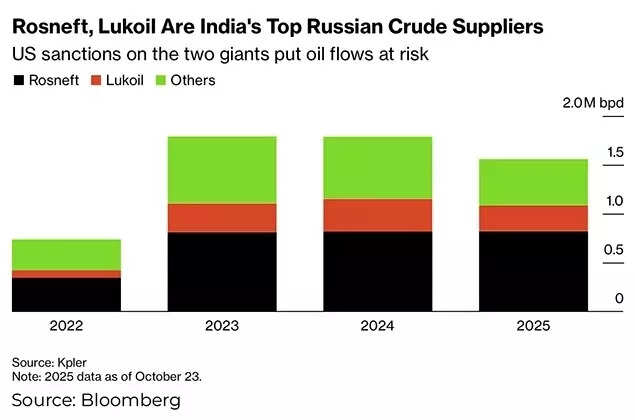Trump sanctions to hit India: Will New Delhi’s crude oil imports from Russia stop? Here’s what analysts say

Trump sanctions to hit India: Indian refiners are preparing to scale up crude oil purchases from the Middle East, Latin America, and the United States to compensate for reduced imports from Russia, analysts told news agency PTI.This comes after the US government on Wednesday imposed fresh US sanctions on two of Moscow’s biggest producers, Rosneft and Lukoil, barring all American entities and individuals from conducting business with them. The Treasury Department has directed that all existing transactions with these companies be wound down by November 21.
Non-US firms could also face penalties if found dealing with the sanctioned entities or their subsidiaries. The move marks one of Washington’s toughest steps yet to curb Moscow’s energy revenues, which it says are “fueling the war” in Ukraine.Will it impact India? Analysts say while near-term Russian flows to India may dip, refiners are likely to continue receiving Russian barrels through intermediaries.
India braces for reduced Russian inflows
Russia currently supplies nearly one-third of India’s crude needs, averaging 1.7 million barrels per day (mbd) in 2025, with around 1.2 mbd coming directly from Rosneft and Lukoil. These supplies have been dominated by private refiners Reliance Industries Ltd (RIL) and Nayara Energy, with smaller volumes handled by state-owned refiners.Russian crude shipments to India are expected to stay within the 1.6–1.8 million barrels per day range until November 21, but imports directly from Rosneft and Lukoil are likely to taper off afterward as Indian refiners move cautiously to avoid potential US sanctions, Sumit Ritolia, Lead Research Analyst (Refining and Modelling) at Kpler said, PTI reported.Reliance, which holds a 25-year term contract with Rosneft to purchase up to 500,000 barrels per day, is expected to adjust its sourcing first, according to industry sources. Nayara Energy, already heavily reliant on Russian crude, faces limited options.“Nonetheless, refiners will continue sourcing Russian grades through third-party intermediaries, which remain unsanctioned, though with heightened caution,” Ritolia added.

Rosneft, Lukoil are India’s top Russian crude suppliers
Refiners turn to Middle East, Latin America, and the US
To compensate for reduced Russian volumes, Indian refiners are expected to increase procurement from the Middle East, Brazil, Latin America, West Africa, Canada, and the United States. “However, higher freight costs could erode arbitrage opportunities and limit large-scale substitution,” Ritolia cautioned.Prashant Vasisht, Senior Vice President and Co-Group Head, Corporate Ratings, ICRA Limited, said the shift away from Russian oil will push up India’s import bill. “The sanctions by the US on certain Russian crude oil producers are likely to impact the purchases by India, as these suppliers accounted for about 60 per cent of the volumes purchased,” Vasisht told PTI.“While India can substitute the purchases from Russia with suppliers from the Middle East and other geographies, the import bill for crude oil would increase. On an annual basis, the replacement by market-priced crude would lead to an increase in import bill by less than 2 per cent,” he noted.
Reliance faces biggest adjustment challenge
Analysts say Reliance Industries, India’s largest private refiner, faces the most immediate impact. “With its term contracts with Rosneft now affected, RIL will need to shift towards third-party spot buying, reworking its supply and financial chains to ensure compliance with OFAC rules while maintaining operational continuity,” Ritolia said.He added that the company may “front-load liftings before enforcement deadlines and later pivot to indirect trade structures, reducing direct imports from sanctioned entities.”A “plausible scenario,” Ritolia said, is that Reliance “temporarily halts direct purchases from Rosneft or Lukoil, leading to a sharp drop in Russian crude inflows in December, followed by a gradual recovery by mid-to-late Q1 2026 as new shell companies and trade channels emerge.”
Nayara Energy to maintain Russian imports
Nayara Energy, already under sanctions and largely dependent on Russian crude, is expected to maintain its current sourcing pattern. “Unless New Delhi steps in with direct pressure, Nayara’s operations and sourcing pattern are unlikely to change materially,” Ritolia told PTI.
Will Russian oil continue to flow in India?
Indian refiners are expected to diversify their import baskets further, ramping up inflows from Latin America (Brazil, Argentina, Colombia, Guyana), West Africa, and the Middle East.While near-term imports of Russian crude may dip starting with December loadings, analysts expect Russian barrels to continue reaching India through intermediaries.“Even with 30 per cent of the crude slate coming from Russia, refiners still process diverse barrels — from heavier Basra Medium, Maya, and Castillata: Vasconia to lighter WTI, Agbami, and Arab Extra Light. The operational challenge is minimal; the economic trade-off (loss of discounts) is the bigger issue,” Ritolia said.“Unless Indian refineries themselves are sanctioned, or the Government of India formally restricts Russian crude – both unlikely scenarios – Russian oil will continue to flow to India (volume may see a dip in the near to short term), albeit through more complex financial, logistical, and trading structures,” he added.While US sanctions may temporarily disrupt India’s access to cheaper Russian barrels, analysts expect refiners to adapt quickly by diversifying supply routes, even if it means facing higher costs and narrower margins in the short term.






